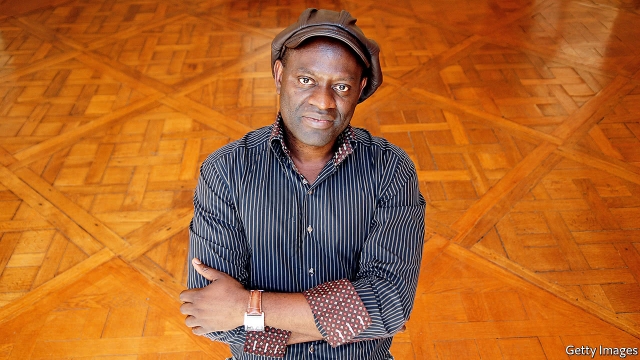But some Francophone writers are not impressed
A PHILOSOPHY graduate and unpublished novelist, Emmanuel Macron treats French culture like a national treasure, and the French language as a jewel. “French is the language of reason, it’s the language of light,” the president declared when inaugurating the Louvre in Abu Dhabi, a silver-domed gallery on a sandy shore that he called a museum “of the desert and light”. Mr Macron has vowed to make French the first language in Africa, and “perhaps” the world; he named a young bestselling Franco-Moroccan novelist, Leïla Slimani, to lead this mission. Yet his campaign to rejuvenate French, and to open the country up to writers who share the language around the world, has inadvertently revived a French culture war.
Today more people speak French in Kinshasa, capital of the Democratic Republic of Congo, than in Paris. By 2050, thanks to population growth in Africa, some 85% of the world’s French-speakers will live on the continent. Mr Macron has been promoting French on his recent travels to the Gulf, China and, pointedly, Ghana, an English-speaking west African country surrounded by French-speaking ones. Visiting Tunisia, he said he wanted to double the number learning French there by 2020.
Mr Macron, who is 40, does this in a decidedly less defensive way than his predecessors (Jacques Chirac once walked out of a summit when a Frenchman spoke in English). He is unapologetic about breaking into English, even on home soil. Nor does he side with purists in seeking to protect the language from mutation. Cardinal Richelieu founded the Académie Française in 1635 to render French “pure”; to this day it devises French neologisms for invasive English terms, such as mot-dièse for hashtag or mégadonnées for big data. Mr Macron argues that “French is not a closed language” and should be fluid. Read Rabelais, he says, to see that French itself was built on patois and vernacular tongues.
He has no hang-ups about redefining French culture, either. While campaigning for the presidency, he appalled traditionalists by declaring that a single “French culture does not exist”. It is not a rigid object, in his view, to be left to gather dust and display in a glass cabinet. Rather, French culture is “a river nourished by numerous confluences”, as much by Marie NDiaye, a part-Senegalese author, as by Victor Hugo.
Merci, mais non merci
It came as something of a surprise to fans of his capacious approach to find it rejected by some of the very writers he seeks to embrace. In January Alain Mabanckou (pictured), a Congolese writer who in 2006 won the Prix Renaudot, a literary prize, for “Memoirs of a Porcupine”, said he would not take part in the president’s project to renovate La Francophonie, a grouping of French-speaking countries. The institution, he said, was merely “a continuation of French foreign policy towards its former colonies”, which props up African despots and treats Francophone writers as the exotic “other”. Writing in Le Monde, Abdourahman Waberi, a Djiboutian professor at Georgetown University, urged France to turn the page on an “outdated vision” based on an “artificial hierarchy” between French and Francophone artists.
La Francophonie “cannot just be an institution for saving the French language; that is not what Francophone countries are worried about,” explains Mr Mabanckou. “Africans don’t need the French language to exist.” He asks how many universities in France teach Francophone African literature, and complains that American students are more likely to study such writers than are French ones. The French literary world clings to a Paris-centric vision, Mr Mabanckou says, too often failing to consider writers from former colonies as part of mainstream literature, as British publishers and universities now do.
The underlying grievance is that Paris-based publishers and academics, by treating non-French writers as “Francophone”, are perpetuating a form of neo-colonial arrogance towards them, and clinging to ownership of the French language. Some such writers cannot believe they are still fighting the battle waged by Salman Rushdie 30 years ago against the concept of “Commonwealth literature” in writing in English. Mr Mabanckou, who prefers to consider his work part of “world literature”, looks back at a figure such as Léopold Senghor, the Senegalese poet who was elected to the Académie Française, as ultimately a defender of French interests.
For some African writers whose maternal language is a local tongue, the very process of writing in French, the language of the former colonial power, still awakens complex feelings. They aim to assert an independent claim to write in French. “Literature written in French does not need to call itself French literature in order to exist,” commented Véronique Tadjo, a Franco-Ivorian writer.
Ms Slimani is mindful of the controversy. She criticises publishers in Paris for not investing enough in French-language writing outside France. “Francophone literature is a world literature, but publishing is very Parisian,” she says. “We need to decentralise, to stop always going through Paris.” A dual citizen who grew up in Morocco, then moved to France to study, she feels at ease in both cultures. She wants to correct the vision of “France at the centre and, around it, in a sort of periphery, what one would call ‘the Francophone world’.” The point, she says, is to “encourage movement, sharing and to value diversity”.
Ms Slimani’s own writing—“Chanson Douce”, published in Britain as “Lullaby” and in America as “The Perfect Nanny”, won the Prix Goncourt in 2016—may help to break down such perceptions. So might the emergence of other new, and often female, voices. For the moment, the best intentions of a well-meaning French president are colliding with the radical critique of writers in French who seek neither the consent nor the approbation of France.
This article appeared in the Books and arts section of the print edition under the headline “The river and the sea”
Source: https://www.economist.com/news/books-and-arts/21736510-some-francophone-writers-are-not-impressed-emmanuel-macron-wants-redefine-french

